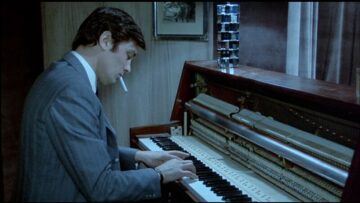Hannah Bhuiya at Artforum:
 Today, Le Samouraï is recognized as a foundational example of neo-noir, and as a spark that lit a fire under Scorsese, Mann, Tarantino, Jarmusch, Woo, Fincher, et al.—see Taxi Driver (1976), Thief (1981), Reservoir Dogs (1992), Ghost Dog (1999), The Killer (1989), and The Killer (2023). Even the Matrix and John Wick franchises are suffused with references to its cult mythology: aloof antiheroes with sharp suits and slick autos pursued on all sides as they stalk through moody cityscapes, inescapably hurtling toward the violent resolution of their own personal destiny? Check. Such respect and veneration from his American and international peers was something the Stetson- and Ray-Ban-sporting Melville, who functioned as something of a godfather to Jean-Luc Godard and the nascent French New Wave, would have been pleased to receive. Unfortunately, his own dramatic personal destiny was to intervene. In 1973, at only fifty-five, the filmmaker suffered a fatal heart attack over lunch while discussing his next picture—a spy thriller set to star Yves Montand and Catherine Deneuve, never to witness the explosive chain reaction in mainstream cinema that his unapologetic, maverick methods had set off.
Today, Le Samouraï is recognized as a foundational example of neo-noir, and as a spark that lit a fire under Scorsese, Mann, Tarantino, Jarmusch, Woo, Fincher, et al.—see Taxi Driver (1976), Thief (1981), Reservoir Dogs (1992), Ghost Dog (1999), The Killer (1989), and The Killer (2023). Even the Matrix and John Wick franchises are suffused with references to its cult mythology: aloof antiheroes with sharp suits and slick autos pursued on all sides as they stalk through moody cityscapes, inescapably hurtling toward the violent resolution of their own personal destiny? Check. Such respect and veneration from his American and international peers was something the Stetson- and Ray-Ban-sporting Melville, who functioned as something of a godfather to Jean-Luc Godard and the nascent French New Wave, would have been pleased to receive. Unfortunately, his own dramatic personal destiny was to intervene. In 1973, at only fifty-five, the filmmaker suffered a fatal heart attack over lunch while discussing his next picture—a spy thriller set to star Yves Montand and Catherine Deneuve, never to witness the explosive chain reaction in mainstream cinema that his unapologetic, maverick methods had set off.
more here.
